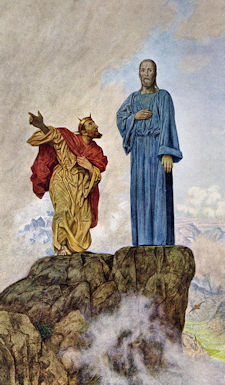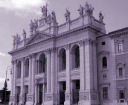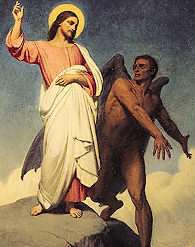» Enjoy our Liturgical Seasons series of e-books!
Communion Antiphon, Matthew 4:4:
One does not live by bread alone, but by every word that comes forth from the mouth of God.
Gospel (excerpt), Luke 4:1-13:
Jesus, full of the Holy Spirit, returned from the Jordan, and was led by the Spirit for forty days in the wilderness, tempted by the devil. And he ate nothing in those days; and when they were ended, he was hungry. The devil said to him, "If you are the Son of God, command this stone to become bread." And Jesus answered him, "It is written, ‘ Man shall not live by bread alone.’" And the devil took him up. and showed him all the kingdoms of the world in a moment of time, and said to him, "To you I will give all this authority and their glory; for it has been delivered to me, and I give it to whom I will. If you, then, will worship me, it shall all be yours." And Jesus answered him, "It is written, ‘ You shall worship the Lord your God, and him only shall you serve.’ "
The scene of the temptation, which opens the public life of Jesus, declares in the Gospels in a very forceful manner the great change in our lives that He introduces into the world by His work of redemption. Where Adam fell, Christ, the new Head of humanity, triumphs over the power of Satan: at the time of His passion "the prince of this world" will be cast out. The Gospel of the temptation heralds Christ's victory in advance.
By appointing this Gospel for the beginning of Lent the Church proclaims that this victory should be ours also. In us, as all around us, it is Christ's temptation, Christ's struggle, Christ's victory which is prolonged; our effort is His and so is our strength; His will be our victory at Easter.
Sunday Mass Readings for Year C:
The First Reading is from Deuteronomy 26:4-10. In these verses we have the ritual prescribed by Moses for the feast of the harvest thanksgiving. The people once settled in the Promised Land are to show their gratitude to the good God who brought them out of the slavery of Egypt and gave them this good land to be their home.
The Second Reading is from St. Paul to the Romans 10:8-13. He is discussing the sad fact that Israel (as a whole) rejected Christ as the promised Messiah and the Son of God.
The Gospel is from St. Luke 5:1-11. Christ's voluntary self-mortification of forty days' fast, with its accompanying temptations, was but part of the self-mortification, with its climax on the Cross, which He gladly underwent for our salvation. He did not need to fast in order to keep the inclinations of the body in subjection, He did not need to allow the insult of temptation. He could have said, "begone Satan" at the beginning as easily and as effectively as be said it at the end. But He willingly underwent this humiliation in order to set us an example and to prove to us the infinite love He bears us and the value, the priceless value, He sets on our eternal salvation. He became like us in all things (except sin) in order to make it possible for us to become like Him—the beloved of his Father—and co-heirs with Him in the kingdom of heaven.
With this example given us by Christ no Christian can or should expect to travel the road to heaven without meeting obstacles and temptations. Our weak human nature is of itself, even without any external tempter, a source of many temptations to us, especially of those three illustrated in the case of Christ. Our body desires all the pleasures and comforts that can be got out of life and resents any curtailment of these desires even on the part of our Creator and Benefactor. Our gifts of intelligence and free-will often tempt most of us to look for power, political or economic, over our fellowmen. We want to be better off than others in this world, when our purpose in life is to help ourselves and our fellowmen to the better life. Finally. so fully occupied are many in the mad rush after pleasure and power that they have no time to devote to the one thing that matters, the attainment of eternal life.
Yet, through some foolish logic of our own, we expect God to do for us what we refuse to do for ourselves. We are tempting God by presuming he will save us if we have deliberately chosen the road to perdition.
There are few, if any, amongst us who can honestly say: "I am free from such inclinations or temptations." The vast majority of us can and should beat our breasts and say with the publican: "O God, be merciful to me a sinner." And merciful he will be if we turn to him with true humility. He may not remove all our temptations, all our wrong inclinations, but he will give us the grace to overcome them if we sincerely seek his aid.
—Excerpted from The Sunday Readings by Fr. Kevin O'Sullivan, O.F.M.
Meditation on the Liturgy:
 Sundays in Lent remain Sundays the day on which the Church marks history's axial point, the Resurrection of the Lord. Even in Lent, Sundays are the Easter of every week, and on each of those days, the Church celebrates Christ's victory over sin and death. Thus fasting on Sundays is generally unknown in Christian penitential practice; some scholars suggest that Sunday fasts were actually forbidden on occasion by church authorities concerned with too-rigorous asceticism.
Sundays in Lent remain Sundays the day on which the Church marks history's axial point, the Resurrection of the Lord. Even in Lent, Sundays are the Easter of every week, and on each of those days, the Church celebrates Christ's victory over sin and death. Thus fasting on Sundays is generally unknown in Christian penitential practice; some scholars suggest that Sunday fasts were actually forbidden on occasion by church authorities concerned with too-rigorous asceticism.
The station churches of the Sundays of Lent reflect the grandeur that is always Sunday and include both major and minor basilicas: the Papal Archbasilica of St. John Lateran, the pope's cathedral church as Bishop of Rome, the station of the First Sunday in Lent and Palm Sunday, while the intervening Sunday stations include St. Mary in Domnica, St. Lawrence Outside the Walls, Holy Cross in Jerusalem, and St. Peter's in the Vatican.
On the First Sunday in Lent, in each of the three years of the Lectionary cycle, the Church proposes for reflection one of the Synoptic evangelists' telling of the story of the tempting of Jesus—the overture, as it were, to his public ministry, and thus the beginning of what will unfold as the itinerary of the Cross. These temptation narratives are perhaps the most dramatic evocation of the grittiness of Lent, for the temptations themselves have a sharp-edged quality to them, and they begin in a gritty place, the Judean wilderness. Yet each evangelist's rendering of the story has a distinctive quality.
Mark, as is his won't, keeps the narrative spare; all we are told is that Satan tempted Jesus in the desert amid "wild beasts" and ministering angels.
Matthew, the evangelical portraitist, fills out the story by rendering the temptations in the sequence that has become most familiar. First, there is the temptation to indulge the flesh by turning stones into bread. The temptation to test divine providence and divine favor follows, as Jesus is asked to throw himself from the pinnacle of the Temple. The series concludes with the temptation to worldly power, which can be attained by worshipping a false deity.
Luke's account of the temptations, however, drives the story even deeper into the gritty soil of history by inverting the sequence of the second and third temptations. Thus the last and gravest temptation takes place in Jerusalem, the holy city to which Luke's entire gospel is oriented. Here, in Jerusalem, Jesus faces the temptation to refuse the destiny the Father has appointed for him—to be the world's savior by stripping himself of himself on the cross. Here, in Jerusalem, Jesus faces the temptation to refuse the destiny the Father has appointed for him—to be the world's savior by stripping himself of himself on the cross. Here, truly, we are history's crossroads. What will Jesus do? Gianfranco Ravasi put the stakes neatly in a commentary on Luke's temptation narrative: Jesus, in "the supreme test of his identity as Messiah," respects "the sovereign freedom of the plan of salvation to which he has been devoted, pronounces his definitive 'Yes' to the Father, and abandons himself completely to his destiny." And this abandonment is not an abstract matter, a decision that could be taken anyplace, anytime. Jesus gives himself entirely to the Father's will here, in this place and at this time: here, in Jerusalem; here, amid the history with which Luke began his Christmas narrative, with its references to the days when Augustus was emperor and "Quirinus was governor of Syria" [Luke 2:2].
…The Jesus whom we follow into the wilderness teaches us, there, the necessity of self-giving and of abandonment to divine providence. By conforming those who are his brothers and sisters to the pattern of his own life, the Risen Lord renders that self-gift liberating in the fullest sense of liberation: He, the first of many brethren, opens the path to eternal life with the Holy Trinity and thereby creates the Communion of Saints. Creation, fallen into disorder, is reordered—and not only reordered but magnified by the redemption, the fulfillment of God's purposes, that lies on the far side of the wilderness of temptation.
— George Weigel, Roman Pilgrimage: Station Churches

First Sunday of Lent
Station with San Giovanni in Laterano (St. John Lateran)
The Station today is at St. John Lateran which is the seat of the Roman Pontiff, and the cathedral church for the Diocese of Rome. The official name of the basilica in Italian is Santissimo Salvatore e Santi Giovanni Battista ed Evangelista in Laterano. The Lateran is comprised of the Basilica, the Pontifical Palace and the Baptistry. The church is dedicated to the Christ the Savior. In the fifth century the titles of St. John Baptist and St. John the Evangelist were added. The Papal altar contains the wooden altar on which St. Peter is said to have celebrated Mass. This basilica is the mother of all churches and is the only church which has the title of Archbasilica.
Click here for a 360 degree virtual tour.
For further information on the Station Churches, see The Stational Church.

First Sunday of Lent
Station with San Giovanni in Laterano (St. John Lateran)
The Station today is at St. John Lateran which is the seat of the Roman Pontiff, and the cathedral church for the Diocese of Rome. The official name of the basilica in Italian is Santissimo Salvatore e Santi Giovanni Battista ed Evangelista in Laterano. The Lateran is comprised of the Basilica, the Pontifical Palace and the Baptistry. The church is dedicated to the Christ the Savior. In the fifth century the titles of St. John Baptist and St. John the Evangelist were added. The Papal altar contains the wooden altar on which St. Peter is said to have celebrated Mass. This basilica is the mother of all churches and is the only church which has the title of Archbasilica.
Click here for a 360 degree virtual tour.
For more on San Giovanni in Laterano, see:
- Churches of Rome Info
- The Station Churches of Rome
- Rome Art Lover
- Roman Churches
- PNAC
- Aleteia
- Station Church
- The Catholic Traveler
For further information on the Station Churches, see The Stational Church.






